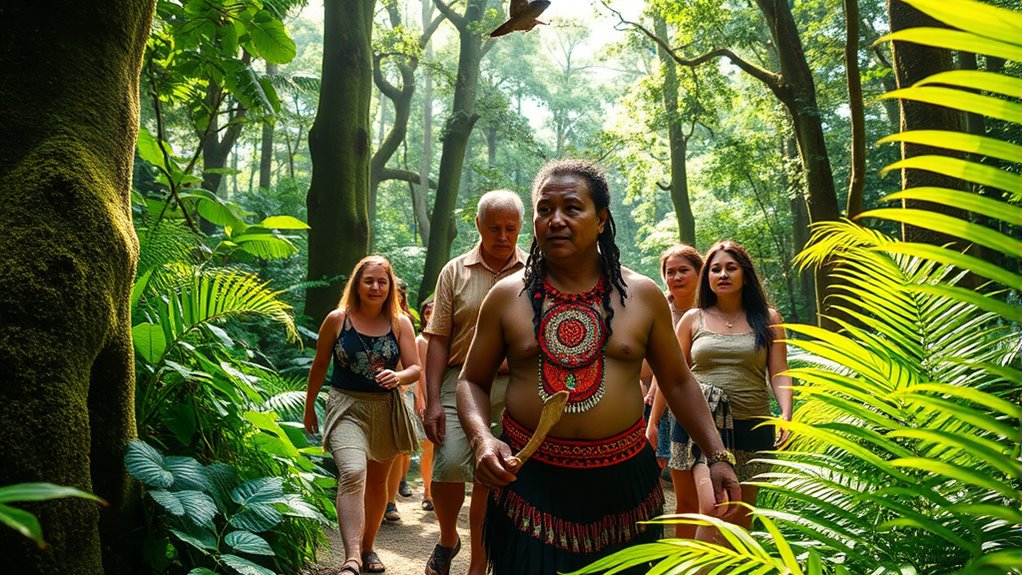Indigenous-led eco tours in the Daintree Rainforest provide an authentic way to experience this lush environment while supporting local communities. You’ll learn about traditional land stories, cultural practices, and native plants from Indigenous guides who share their knowledge and customs. These tours focus on conservation and eco-friendly practices, helping protect the rainforest’s fragile ecosystem. If you keep exploring, you’ll discover how these experiences promote cultural understanding and sustainable tourism that benefits everyone involved.
Key Takeaways
- Indigenous-led eco tours focus on sustainable practices, cultural heritage, and ecological preservation within the Daintree Rainforest.
- Tours feature storytelling, land connections, spiritual sites, and traditional ceremonies shared by Indigenous guides.
- Visitors learn about native flora, fauna, Dreamtime stories, and traditional craft techniques.
- These tours support rainforest conservation, reduce environmental impact, and promote biodiversity awareness.
- They empower Indigenous communities through cultural sharing, economic benefits, and preservation of traditions.
The Significance of Indigenous Knowledge in Eco Tourism

Indigenous knowledge plays an essential role in eco tourism by providing authentic insights into the rainforest’s ecosystems and cultural heritage. Through Indigenous storytelling, you gain a deeper understanding of the land, animals, and plants from those who have lived here for generations. These stories reveal how the rainforest sustains local communities and the spiritual connections they maintain with nature. Traditional ceremonies, often performed during eco tours, allow you to witness sacred rituals that honor the environment and preserve cultural traditions. Participating in these ceremonies offers a unique, respectful glimpse into Indigenous beliefs and practices. This knowledge enriches your experience, fostering appreciation and respect for the Indigenous peoples’ deep-rooted bond with the rainforest. Additionally, understanding the use of natural resources and traditional ecological knowledge deepens your appreciation of sustainable practices rooted in Indigenous culture. Recognizing these Indigenous conservation techniques highlights the importance of protecting the rainforest’s biodiversity. It also emphasizes the significance of cultural heritage preservation in maintaining ecological balance. Highlighting the integration of traditional practices with modern conservation ensures that ecological efforts are both effective and culturally respectful. It’s a genuine way to connect with the land’s history and its custodians, especially when incorporating indigenous-led conservation efforts that focus on preserving native ecosystems and cultural practices. Moreover, learning about Indigenous land management practices can inspire broader conservation initiatives that benefit both the environment and local communities.
How Indigenous-Led Tours Enhance Your Daintree Experience

Participating in Indigenous-led tours transforms your Daintree rainforest experience by offering authentic insights that you simply can’t get elsewhere. You’ll learn about the rich cultural heritage, including indigenous art that depicts traditional stories and connections to the land. These tours often include demonstrations of traditional craft techniques, deepening your understanding of Indigenous creativity. Furthermore, your experience supports language preservation efforts, as guides share their native language and stories, helping keep cultural traditions alive. This firsthand engagement allows you to see the rainforest through Indigenous eyes, fostering respect and appreciation for their ongoing relationship with the land. Incorporating cultural traits into your understanding enriches the experience even further. Learning about traditional land management practices can also provide insight into sustainable environmental stewardship, which is vital in preserving the rainforest. Additionally, engaging with Indigenous guides offers a unique perspective on traditional ecological knowledge, enhancing your overall appreciation for the environment. Recognizing the importance of recurring cultural themes can deepen your connection to the stories shared during the tour. Embracing intergenerational knowledge transfer can further illuminate how cultural traditions are maintained over time. By choosing an Indigenous-led tour, you not only gain a more meaningful experience but also contribute to the preservation of their vibrant cultural heritage.
Examples of Indigenous-Led Eco Tours in the Daintree Rainforest
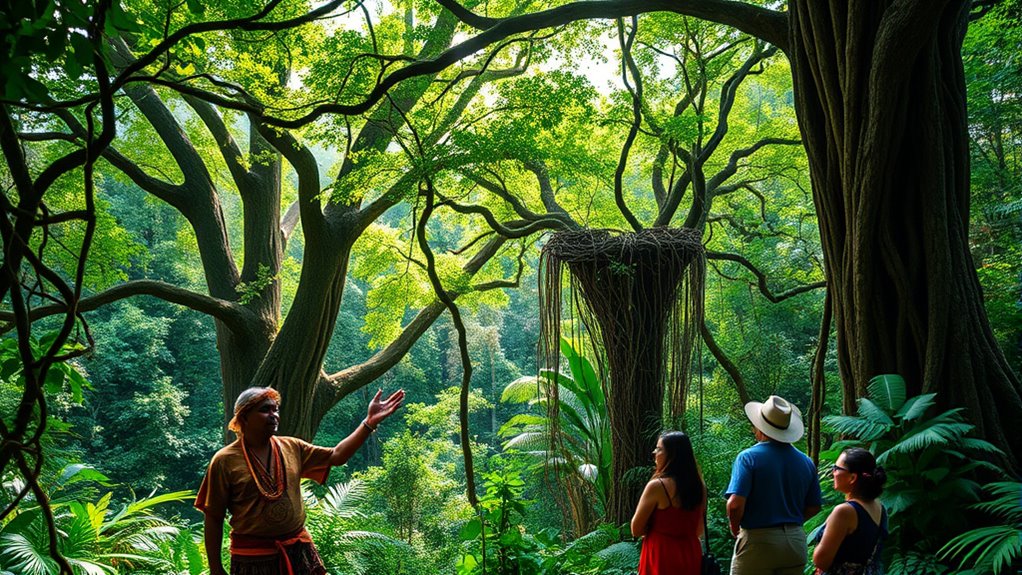
Several guided eco tours in the Daintree Rainforest showcase the rich cultural knowledge of Indigenous communities. These tours often include visits to sacred sites, where you can learn about their spiritual significance and connection to the land. You might also encounter displays of Aboriginal art, which tell stories and preserve traditions through intricate symbols and designs. One popular tour takes you to areas where the land holds deep spiritual meaning, allowing you to appreciate the sacredness of these locations firsthand. Guides share stories behind the art and sites, helping you understand their cultural importance. These experiences provide a deeper respect for Indigenous heritage while highlighting the beauty and significance of the rainforest’s cultural landscape.
Cultural Insights and Traditional Practices Shared on Tours
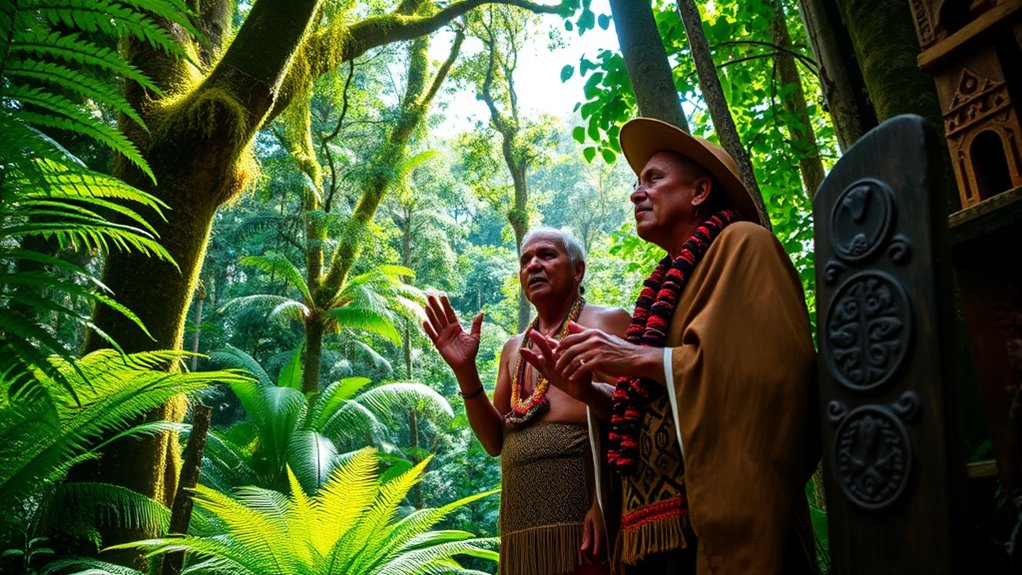
On these tours, you’ll hear mesmerizing Dreamtime stories and legends that connect you to the land’s ancient past. You’ll also get the chance to taste traditional bush foods and watch Indigenous craft demonstrations firsthand. These experiences give you a deeper understanding of the rich cultural practices that shape the community. Additionally, learning about the significance of pottery firing techniques offers insight into the Hopi Tribe’s unique craftsmanship and spiritual traditions pottery firing techniques. Engaging with these cultural elements enhances your cultural intelligence, fostering a greater appreciation for the community’s diverse heritage.
Dreamtime Stories and Legends
Have you ever wondered how the stories of the Dreamtime shape the identity and spirituality of the Indigenous communities in the Daintree Rainforest? Dreamtime stories are more than myths; they’re the foundation of their culture, explaining how the land, animals, and humans came to be. When you join an Indigenous-led eco tour, you’ll hear legends and storytelling that reveal the deep connections between people and nature. These stories pass down wisdom, morals, and traditions from generation to generation. Listening to these tales offers a window into their world, showing how they interpret their environment and maintain their cultural identity. These oral traditions often utilize specific storytelling techniques that enhance their cultural significance and emotional impact. Through these stories, you gain a richer understanding of the rainforest’s spiritual significance and the enduring legacy of Indigenous knowledge. Recognizing the importance of sound design in storytelling helps to appreciate how these oral traditions are preserved and shared through engaging narratives. Understanding cultural practices enhances your appreciation of their storytelling traditions and the respect they hold for their environment. Additionally, the use of digital preservation methods ensures that these stories are safeguarded for future generations.
Traditional Bush Foods
Ever wondered how Indigenous communities in the Daintree Rainforest sustain themselves through their traditional foods? On these eco tours, you’ll learn about traditional bush foods that form the core of indigenous cuisine. These foods are not only essential for survival but also hold cultural significance.
- Bush tomatoes – used for flavoring and healing, they’re a staple in indigenous diets.
- Finger lime – a citrus native to the area, valued for its tangy flavor.
- Kakadu plum – rich in antioxidants, it’s prized for both nutrition and medicinal properties.
- Bush bananas – providing energy and sustenance, they’re an indispensable food source.
These foods reveal a deep connection to the land and showcase traditional practices passed down through generations.
Indigenous Craft Demonstrations
As you explore the Daintree Rainforest on these eco tours, you’ll witness Indigenous artisans sharing their craft techniques, offering a firsthand look at traditional practices. During indigenous craft demonstrations, you’ll see how they create traditional art techniques, such as weaving, painting, and carving using natural materials. These demonstrations give you insight into the cultural significance behind each craft, connecting you directly to Indigenous stories and heritage. The artisans often explain the meaning behind symbols and methods, enriching your understanding of their traditions. Watching these skills in action allows you to appreciate the craftsmanship passed down through generations. It’s an authentic experience that deepens your respect for Indigenous culture while supporting their efforts to preserve and celebrate their traditional art techniques.
Supporting Local Communities Through Responsible Tourism
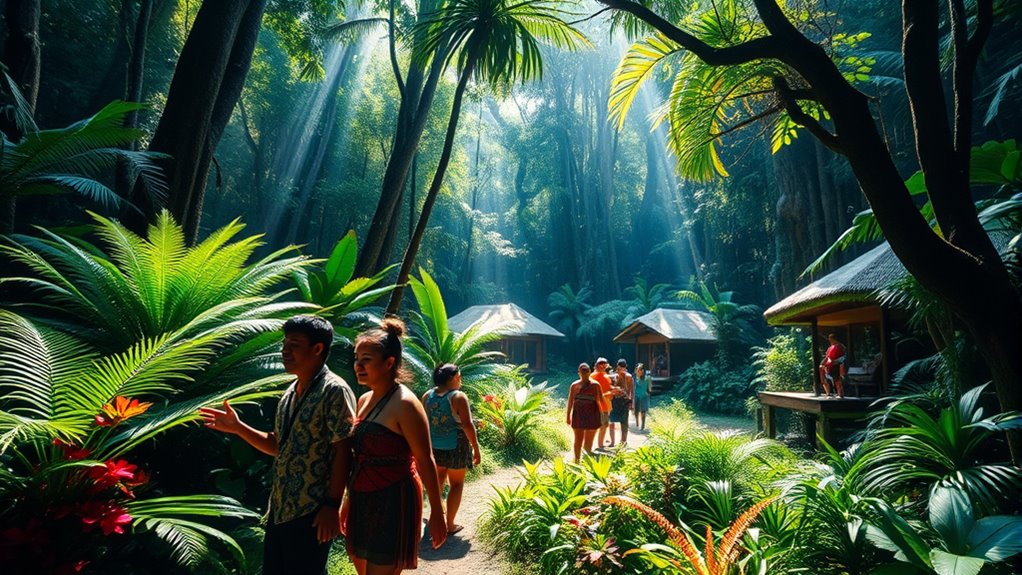
Supporting local communities through responsible tourism guarantees that economic benefits reach those who need them most, empowering Indigenous Australians and local residents alike. Your involvement helps sustain cultural festivals, where traditions come alive and foster community pride. You also contribute to the promotion of Indigenous art, which provides artisans with essential income and recognition. By engaging in authentic experiences, you create a direct link between visitors and the community, ensuring fair compensation. Additionally, supporting local businesses, like markets and eateries, keeps money within the community. Here are four ways your responsible tourism supports the community:
- Funding cultural festivals and events
- Promoting Indigenous art and craftsmanship
- Supporting local businesses and markets
- Empowering community-led tourism initiatives
Furthermore, participating in cultural festivals helps preserve indigenous traditions and fosters a deeper understanding of their cultural significance. Incorporating supportive community practices can further strengthen sustainable tourism efforts, ensuring long-term benefits for all involved. Emphasizing the importance of economic benefits helps highlight how responsible tourism can uplift communities economically and socially, aligning with the goal of sustainable development.
Sustainable Practices and Environmental Conservation Efforts
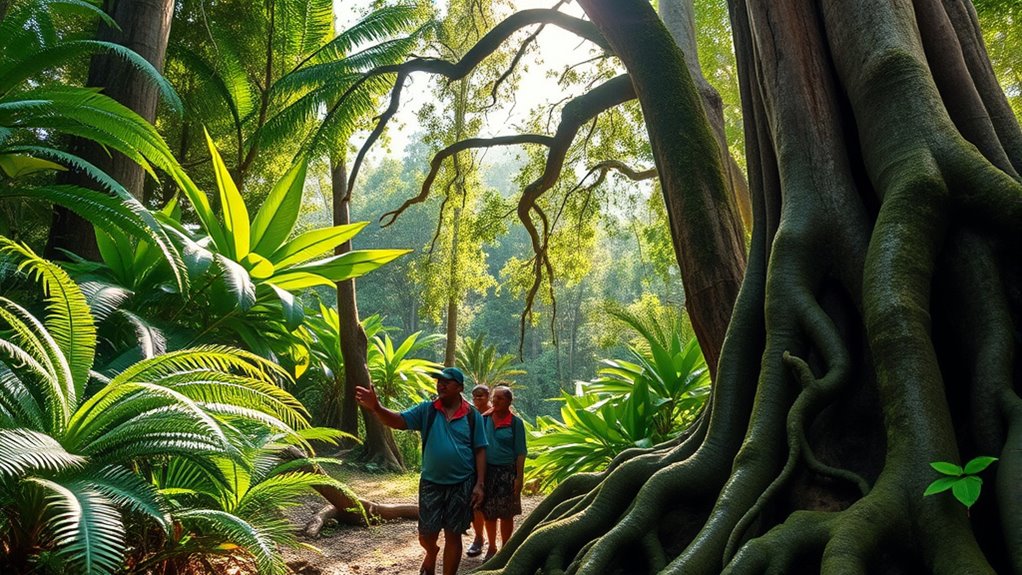
As a visitor, you can support eco-friendly tour operations that minimize environmental impact and promote sustainability. Indigenous guides often lead initiatives to preserve local culture and protect wildlife habitats. By choosing these tours, you actively contribute to ongoing conservation efforts in the Daintree Rainforest.
Eco-Friendly Tour Operations
Eco-friendly tour operations in the Daintree Rainforest prioritize sustainability and conservation at every step. You’ll find that these tours minimize environmental impact while enhancing your experience. To achieve this, operators implement practices such as:
- Using eco-friendly transportation to reduce carbon emissions during wildlife photography outings.
- Incorporating renewable energy sources for tour facilities and equipment.
- Educating visitors on responsible wildlife viewing and preservation efforts.
- Offering adventure sports that follow strict safety and environmental standards, ensuring minimal disturbance to ecosystems.
Cultural Preservation Initiatives
Eco-tour operators in the Daintree Rainforest are actively engaging in cultural preservation initiatives that honor and protect Indigenous traditions and knowledge. You’ll experience authentic traditional dance performances, where elders share stories through movement that preserve ancestral customs. These operators also facilitate ritual ceremonies, allowing you to witness sacred practices that sustain spiritual connections to the land. By showcasing these cultural expressions, they help guarantee that Indigenous communities maintain their identity and pass down their heritage to future generations. Your participation supports the preservation of valuable traditions, fostering respect and understanding. These initiatives strengthen cultural resilience while promoting eco-tourism that values Indigenous voices and knowledge systems. Through these efforts, you help sustain the rich cultural tapestry of the Daintree Rainforest’s Indigenous peoples.
Wildlife Conservation Efforts
Wildlife conservation efforts in the Daintree Rainforest focus on sustainable practices that protect the region’s unique ecosystems. You’ll find initiatives that prioritize native flora preservation and respect sacred sites, ensuring cultural and environmental harmony. These efforts include:
- Implementing eco-friendly tour practices that minimize disturbance to wildlife.
- Protecting native flora by controlling invasive species and promoting reforestation.
- Preserving sacred sites, which are essential habitats for many species and hold cultural significance.
- Engaging local Indigenous communities in conservation decisions, blending traditional knowledge with modern science.
Preparing for an Authentic Indigenous Eco Tour Adventure
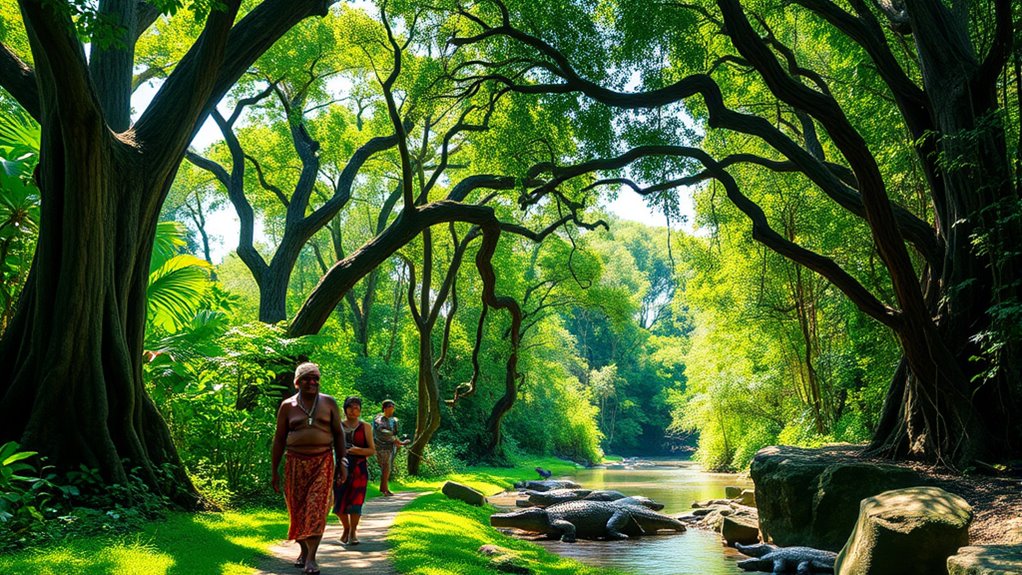
To fully enjoy an authentic Indigenous-led eco tour in Daintree Rainforest, it’s essential to do a bit of preparation beforehand. First, brush up on local wildlife and plant knowledge to enhance your wildlife photography opportunities. Wear comfortable, weather-appropriate clothing and sturdy shoes suitable for adventure activities like walking or canopy tours. Bring a camera or binoculars to observe and capture the rainforest’s vibrant life. Respect the land by following guides’ instructions and asking questions about Indigenous culture and traditions. Hydrate well and pack essentials such as insect repellent, sunscreen, and a hat. Being prepared allows you to stay engaged, appreciate the environment deeply, and participate fully in the cultural experiences, ensuring your eco tour feels genuine, rewarding, and memorable.
The Impact of Cultural Tourism on Daintree’s Ecosystem Preservation
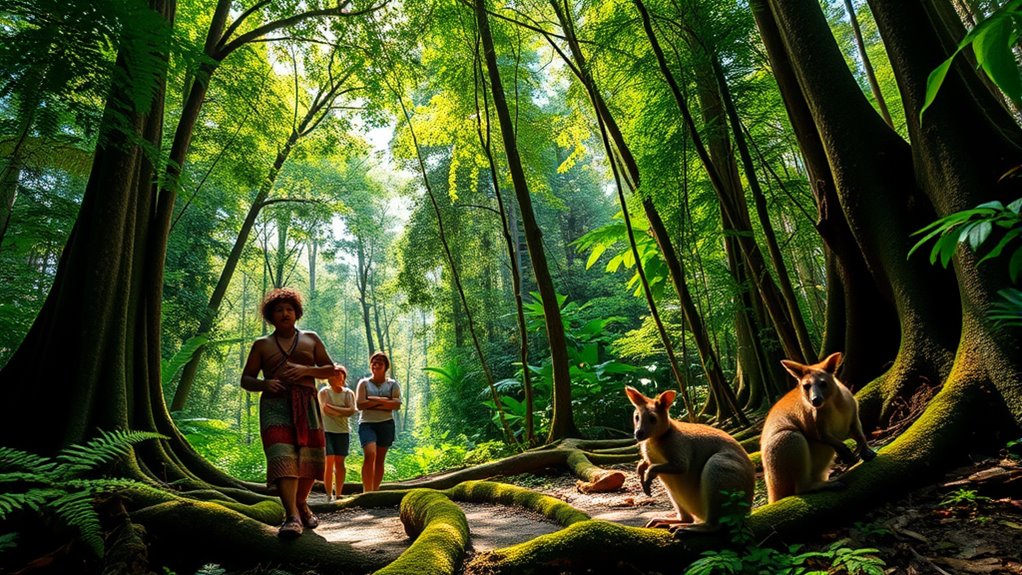
By engaging in Indigenous-led cultural tourism in Daintree Rainforest, you help foster appreciation and understanding of the area’s rich traditions. This form of tourism can positively influence ecosystem preservation through careful visitor management and awareness of ecological impacts. Responsible tours minimize environmental disturbance, promote conservation, and support local Indigenous communities.
Consider these key factors:
- Implementing strict visitor limits to reduce ecological strain.
- Educating tourists on the importance of protecting native flora and fauna.
- Promoting sustainable practices that respect cultural sites and ecosystems.
- Monitoring ecological impacts continuously to adapt management strategies.
Your participation ensures tourism remains a force for both cultural appreciation and environmental preservation, helping maintain Daintree’s unique biodiversity for future generations.
Frequently Asked Questions
How Do Indigenous-Led Tours Differ From Other Eco Tours?
When comparing tours, Indigenous-led experiences stand out by emphasizing cultural authenticity and community involvement. You get authentic insights into traditions, stories, and practices directly from Indigenous guides, enriching your understanding. These tours often prioritize reducing environmental impact by promoting sustainable practices rooted in Indigenous knowledge. Unlike other eco tours, Indigenous-led options guarantee respect for the land and culture, offering a more meaningful, responsible, and immersive experience for you.
Are There Age Restrictions for Participating in Indigenous Eco Tours?
Age restrictions vary depending on the tour provider, but generally, participant eligibility for indigenous eco tours is set to guarantee safety and meaningful experience. Some tours may have minimum age requirements, often around 8 or 10 years old, while others might accept older children and teens. It’s best to check each tour’s specific policies beforehand. Always consider safety and maturity levels to ensure you and your family enjoy the experience fully.
What Safety Measures Are in Place During Cultural Tours?
Imagine you’re stepping into a world where safety is priority. During cultural tours, guides enforce strict emergency protocols and cultural sensitivity to safeguard both visitors and the community. You’ll find clear safety instructions, trained staff, and respectful engagement with local traditions. These measures ensure a safe, enriching experience, making sure you enjoy the beauty of the rainforest while respecting its indigenous roots. Your safety is always the tour’s top priority.
Can Visitors Purchase Indigenous Crafts or Artwork During Tours?
During your tour, you can purchase cultural souvenirs and traditional artwork directly from Indigenous artisans. These authentic crafts often reflect their heritage and storytelling, making your experience more meaningful. Vendors typically offer a variety of items like paintings, jewelry, and carvings. Buying these crafts supports Indigenous communities and helps preserve their culture. Just ask your guide or the local vendors, and you’ll find beautiful, unique pieces to take home as souvenirs.
How Do Tours Ensure the Protection of Sacred Indigenous Sites?
You can trust that tours prioritize protecting sacred indigenous sites through strict site management practices. They guarantee cultural preservation by respecting local traditions and only visiting designated areas. Guides are trained to handle these sites with care, sharing their significance respectfully. This approach helps maintain the cultural integrity of the indigenous communities while allowing you to experience the rainforest’s beauty responsibly. Your participation supports sustainable tourism and cultural preservation efforts.
Conclusion
Choosing an indigenous-led eco tour in the Daintree is like opening a door to a hidden world, where nature and culture intertwine seamlessly. By immersing yourself in their traditions and respecting the land, you’ll help preserve this ancient rainforest for generations to come. These tours don’t just offer an adventure—they create a meaningful connection that supports local communities and conservation efforts. Embrace this experience and become a steward of the Daintree’s incredible heritage.

